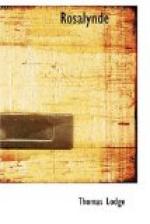[Footnote 1: wormwood = bitterness.]
These words of Montanus brought the king into a great wonder, amazed as much at his wit as his attire, insomuch that he took the papers off his hook, and read them to this effect:
Montanus’ first Sonnet
Alas! how wander I amidst
these woods
Whereas no day-bright
shine doth find access;
But where the melancholy fleeting
floods,
Dark as the night,
my night of woes express.
Disarmed of reason, spoiled
of nature’s goods,
Without redress
to salve my heaviness
I
walk, whilst thought, too cruel to my harms,
With
endless grief my heedless judgment charms.
My silent tongue assailed
by secret fear,
My traitorous
eyes imprisoned in their joy,
My fatal peace devoured in
feigned cheer,
My heart enforced
to harbor in annoy,
My reason robbed of power
by yielding ear,
My fond opinions
slave to every toy.
O
Love! thou guide in my uncertain way,
Woe
to thy bow, thy fire, the cause of my decay.
Et florida pungunt.
When the king had read this sonnet he highly commended the device of the shepherd, that could so wittily wrap his passions in a shadow, and so covertly conceal that which bred his chiefest discontent; affirming, that as the least shrubs have their tops, the smallest hairs their shadows, so the meanest swains had their fancies, and in their kind were as chary of love as a king. Whetted on with this device, he took the second and read it: the effects were these:
Montanus’ second Sonnet
When the Dog[1]
Full of rage,
With
his ireful eyes
Frowns
amidst the skies,
The shepherd, to assuage
The
fury of the heat,
Himself
doth safely seat
By a fount




